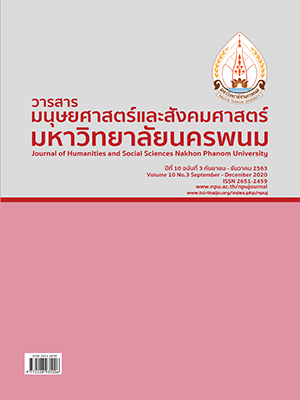THE ROTATION OF AUDITOR AND EARNINGS MANAGEMENT
Main Article Content
Abstract
The purpose of this study is to examine the relationship between the rotation of auditor and earnings management, using 249 Firm-Year in The Stock Exchange of Thailand (SET) during 2011 to 2016 (6 years). The rotation of auditor could be divided into 2 levels: audit rotation and audit firm rotation (FR), and discretionary accruals were calculated, based on Modified Jones Model (1995), as a proxy of earnings management. The results of this study indicated that the rotation of auditor at both levels was not significantly correlated with the magnitude of earnings management (absolute value of discretionary accruals). However, the study found that the leverage and the type of audit firm had a significant negative relationship to discretionary accruals. The company's losses also had a significant positive relationship to earnings management.
Article Details
References
สัจจวัฒน์ จันทร์หอม และศิลปพร ศรีจั่นเพชร. (2555). คุณภาพกำไรของบริษัทครอบครัวไทย. วารสารวิชาชีพบัญชี, 8(21), 78-88.
สำนักงานคณะกรรมการกำกับหลักทรัพย์และตลาดหลักทรัพย์. (2548). ประกาศสำนักงานคณะกรรมการกำกับหลักทรัพย์และตลาดหลักทรัพย์ ที่ กจ. 39/2548 เรื่อง หลักเกณฑ์ เงื่อนไข และวิธีการรายงานการเปิดเผยข้อมูลเกี่ยวกับฐานะการเงินและผลการดำเนินงานของบริษัทที่ออกหลักทรัพย์ (ฉบับที่ 20). สืบค้นเมื่อ 11 พฤศจิกายน 2560, จาก www.sec.or.th.
อนุชา ถาพยอม. (2555). ความสัมพันธ์ระหว่างระยะเวลาการเป็นผู้สอบบัญชีในบริษัทลูกค้า การหมุนเวียนผู้สอบบัญชี กับคุณภาพกำไรของบริษัทจดทะเบียนในตลาดหลักทรัพย์แห่งประเทศไทยใน SET100. ปริญญาบริหารธุรกิจมหาบัณฑิต. มหาวิทยาลัยเกษตรศาสตร์, คณะบริหารธุรกิจ.
Ardison K., Martinez A., & Galdi F. (2012). The Effect of Leverage on Earnings Management in Brazil. Advances on Scientific and Applied Accounting, 5(3), 305-324.
Becker, C. L., Defond, M. L., Jiambalvo, J., & Subramanyam, K. R. (1998). The Effect of Audit Quality on Earnings Management. Contemporary Accounting Research, 15(1), 1-24.
Chi, W., & Huang, H. (2005). Discretionary accruals, audit-firm tenure and audit partner tenure: Empirical evidence from Taiwan. Journal of Contemporary, Accounting and Economics, 65-92.
Dechow, P. M., & Dichev, I. (2002). The Quality of Accruals and Earnings: The Role of Accrual Estimation Errors. The Accounting Review, 77, 35-59.
Defond, M. L., & Jiambalvo, J. (1995). Debt covent violant and manipulation of accruals. Journal of Accounting and Economics, 17(1-2), 145-176.
Jennings, M. M., Pany, K. J., & Reckers, P. M. J. (2006). Strong Corporate Governance and Audit Firm Rotation: Effects on Judes’ Independence Perceptions and Litigation Judgement. Accounting Horizons, 20(3), 253-270.
Jones, J. (1991). Earnings Management During Improt Relief Investigations. Journal of Accounting Research, 29(2), 193-228.
Myers, J. N., Myers, L. A., & Omer, T. C. (2003). Exploring the Term of the Auditor-Client Relationship and the Quality of Earnings: A Case for Mandatory Auditor Rotation?. The Accounting Review, 78(3), 779-799.
Translated Thai Reference
Henchoakchaichana, N. (2015). Thai Financial Reporting Standards Framework (revised 2014). Journal of Accounting Profession, 11(30), 78-84. [in Thai]
Junhom, S. & Srijunpetch, S. (2012). Earning Quality of Thai Family-Owned Firm. Journal of Accounting Profession, 8(21), 78-88. [in Thai]
The Securities and Exchange Commission, Thailand. (2005). KorJor. 39/2548 Re: Rules, Conditions and Procedures for the Disclosure of Financial Status and Operating Results of the Issuing Company (Issue 20). Retrieved on November 11, 2017, from www.sec.or.th. [in Thai]
Tapayhom, A. (2012). The relationship between the auditor tenure, auditor rotation and earnings quality of companies listed on the stock exchange of Thailand in SET100 index. (Master’s Thesis). Kasetsart University, Bangkok, Thailand.[in Thai]


